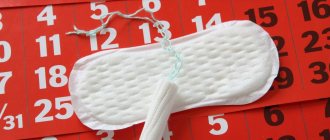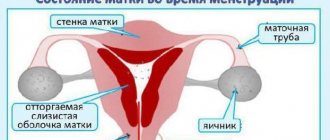Every month, every woman of reproductive age experiences a menstrual period, which can cause a lot of problems with well-being. Among them: uterine pain, slight weakness, mild nausea. But the women who suffer most are those whose negative manifestations are accompanied by severe irritation in the vaginal area. What causes excruciating itching and painful burning during menstruation? How can you get rid of the constant feeling of discomfort?
Exhausting itching during menstruation: external causes
- Neglect of body care rules.
- Infrequent change of products designed to absorb blood.
- Increased sensitivity to hygiene products.
When itching in the intimate area during menstruation is present due to the influence of external factors, the following non-drug measures help:
- wearing cotton underwear;
- thorough cleansing procedures;
- frequent change of pads and tampons;
- the use of special intimate gels;
- refusal to visit the pool or beach;
- using a shower instead of a bath.
If itching in the intimate area during menstruation bothers you due to external factors, then as a result of their elimination, the inconvenience immediately disappears.
According to scientists, in addition to external influences, the culprits of irritation of the genital mucosa are the nerve fibers of the vagina, which can become inflamed on special days. There are also possible options in which the intimate area itches during menstruation due to unknown processes in the body.
Internal motives for discomfort
Itching during menstruation, provoked by pathological changes, is unbearable and persistent. It cannot be eliminated through careful hygiene. Unfavorable factors include the following infections and painful abnormalities of the body.
Candidiasis
The feeling of discomfort is provoked by thrush. Skin irritation occurs against the background of specific secretions in the form of cottage cheese. As the pathology progresses, the discomfort becomes unbearable. Continuous damage to the delicate area leads to damage to the mucous membrane. There is pain when urinating, and the labia become swollen.
Trichomoniasis
With this disease, even before the “critical days,” there is irritation in the intimate area caused by watery yellowish or greenish discharge. With the arrival of menstruation, discomfort increases. The feeling of heat is accompanied by a strong burning sensation.
Colpitis
The disease is characterized by the presence of purulent discharge. Grayish or slightly yellow signs of the pathological process are easily detected on the gasket. During menstruation, an exacerbation occurs.
Chlamydia
In this case, mild skin irritation is present regardless of menstruation, and then increases against its background. In addition, dirty-colored discharge is detected, swelling and soreness of the genital organs appear.
Gonorrheal vaginitis
With this pathology, menstruation begins earlier or later and is accompanied by painful irritation, increased body temperature, and lack of libido.
Bacterial vaginosis
The disease is caused by gardnerella. Activation of the bacterium occurs against the background of altered vaginal microflora. There is a presence of watery discharge with a fishy odor, which intensifies significantly on menstruation days.
Herpetic lesion
The intracellular parasite provokes a relapse of the disease during the menstrual period. Skin irritation is accompanied by the appearance of ulcers containing liquid on the genitals. These blisters itch painfully.
Vulvovaginitis
Unpleasant sensations provoked by the papilloma virus become especially pronounced during menstruation. New growths irritate delicate skin in a delicate place.
Chronic adnexitis
Against the background of ovarian inflammation, a woman complains of negative sensations in the genital area, pain in the lower abdomen, decreased libido, and increased temperature.
Liver abnormalities
With the onset of menstruation, some women experience increased signs of liver or gallbladder inflammation. Against the background of such exacerbations, painful sensations appear in the delicate area. They are accompanied by aching pain under the right rib.
Diabetes
Glucose-rich urine irritates the delicate mucous membrane of the genital organs. An endocrinological disease is characterized by thirst and an increase in the volume of fluid secreted by the kidneys. With diabetes, not only the delicate area itches, but the whole body.
Neurological abnormalities
When nerve structures are damaged, in addition to irritation of the mucous membrane, the following additional symptoms are noted: suspiciousness and anxiety, anger, sleep disturbances, hallucinations, discomfort from sound and light stimuli.
Vaginal itching, provoked by stress factors, bothers women only in the evening, and does not appear the rest of the day.
Important! It will not be possible to identify a hidden disease in which, during the next menstruation, itching in a delicate place has reappeared without the help of a specialist. Only a doctor can determine the main cause of the illness and recommend effective treatment.
Eliminating itching using traditional methods
Itching during menstruation can be treated using traditional medicine. The most effective way to get rid of discomfort is home douching, which is carried out by rinsing the vaginal cavity with solutions popular among folk practitioners:
Recipe 1. A solution obtained by mixing 10 drops of iodine, a teaspoon of soda and the same amount of salt in 1 liter of boiled water. Douching should be done twice a day, which will allow you to get rid of unpleasant sensations within a week.
Recipe 2. The product, prepared by dissolving a teaspoon of soda in a liter of water, should be used morning and evening.
Recipe 3. Chamomile decoction, diluted with water in an amount of 1:1, which must be administered using a vaginal douche into the vaginal cavity twice a day in an amount of 100-200 ml. To prepare the product, you need to boil two tablespoons of dried plant flowers in a liter of water for 15-20 minutes, followed by filtering the solution.
Recipe 4. Calendula infusion. Three tablespoons of dried plant flowers must be poured into 0.5 liters of boiling water, cover with a lid and leave for about 3-4 hours. Then strain thoroughly and use as a syringe 2-3 times a day for a week.
Good results can be obtained by ingesting a basil solution kept in a water bath. This remedy is recommended to be used as monotherapy or in combination with medications purchased at the pharmacy.
What methods are there to get rid of the disease?
With increased resistance of the body to the components of tampons and pads, the unpleasant sensations that occur exclusively during menstruation immediately disappear after the end of the “critical days” or when switching to daily pads. It helps to buy hygiene products from a more well-known manufacturer. It is advisable to use hypoallergenic products without aromatic additives.
If you have a food allergy, exclude confectionery, baked goods, alcohol, citrus fruits, seafood and peanuts from the diet. In order to restore the vaginal microflora, a large amount of fermented milk products is introduced into the diet.
Drug treatment depends only on the root cause of the disease. Drugs are prescribed taking into account the advanced stage of the disease and its course. Topical, oral or injection therapy is used. To eliminate diabetes mellitus, a blood test is performed.
What to do if itching occurs during menstruation
The algorithm of actions when this symptom appears is as follows:
- Try using pads or tampons from another brand; they need to be changed frequently (at least once every 2 hours) without waiting for them to be filled.
- Take an antiallergic drug: Erius, Ceterizine, Loratadine.
- Perform intimate hygiene with water, sage or chamomile decoction.
- Eliminate from your diet: chocolate, peanuts, seafood, citrus fruits, fried foods.
- Donate blood on an empty stomach in the morning for sugar testing in any paid or free laboratory.
At the end of menstruation, you need to contact a gynecologist who will conduct an examination, take the necessary tests and prescribe an ultrasound, colposcopy or other studies. Only based on the results of such an examination, treatment is prescribed that will eliminate exactly your cause of itching during menstruation.
External factors causing discomfort in an intimate place
Irritation is caused, on the one hand, by insufficiently frequent washing away of the manifestations of menstruation. In such an environment, various kinds of microorganisms (bacteria, fungi) multiply quickly, causing itching. On the other hand, itching during menstruation can be associated with excessive washing and the use of various hygiene products that can negatively affect the skin, drying it out and causing a burning sensation.
The reason may be related to the use of conventional hygiene products. Unpleasant sensations may result from infrequent replacement of absorbent tampons (pads), as well as the use of those that cause an allergic reaction.
Constantly wearing underwear made of material that is non-breathable and unfriendly to the body (synthetics, satin) can become an irritant under normal conditions. On menstrual days, when the skin is most vulnerable, the risk of discomfort increases.
Causes of itching without discharge or odor
Discharges with an unpleasant, pungent odor, thick consistency, and unusual color are found in various pathological processes in the body. If the vagina itches a lot, but there are no listed symptoms, the reason lies in something else. This problem can be caused by:
- papillomas on the genitals;
- underwear made of synthetic fabrics;
- prickly heat (more common in obese women);
- douching with medicinal solutions;
- any allergic reactions.
In pregnant women, another possible reason for such sensations is a change in hormonal levels. Under the influence of certain hormones, the balance of microflora in the vagina changes, and its acid-base environment may also change, which leads to the problem. Another option is a burning sensation due to drops of urine, which can be involuntarily released during late pregnancy and serve as a breeding ground for pathogenic bacteria.
Physiological conditions
5.1. Pregnancy
Slight itching during pregnancy may occur due to changes in hormonal levels, leading to a decrease in the sensitivity threshold. However, the most common causes of its occurrence are thrush (candidiasis) and bacterial vaginosis. It usually itches the vagina and vulva area.
5.2. During your period
Discharge during menstruation is sometimes accompanied by moderate itching in the vagina and its vestibule. This is due to their irritating effect, especially when sanitary pads and tampons are rarely changed.
In addition, during this period, existing gynecological and venereal diseases worsen, so the entire intimate area may “itch” (this depends on the nature of the lesion and the intensity of the symptoms of a particular disease). To understand the nature of the itching and rule out possible infections, consult a doctor.
5.3. Ovulation
During ovulation, the discharge becomes most abundant and watery. They increase moisture in the area of the groin folds and labia and can cause itching, and tight underwear and shaving further aggravate the situation. Normally, symptoms should be short-lived and disappear at the end of the cycle.
5.4. After intercourse
After unprotected sex, a common cause of discomfort in the vagina, vulva and inguinal folds are STIs, as well as the reaction of the mucous membranes and skin to the partner’s sperm and microtrauma (during anal sex, itching can be in the anus and perineum).
Less commonly, symptoms after intimacy occur due to allergies to sperm proteins, barrier contraceptives, including condom latex.
5.5. Climax
Vulvovaginal itching during menopause is caused by the extinction of ovarian activity and corresponding hormonal changes.
A woman develops dry mucous membranes, soreness and increased vulnerability of the mucous membranes of the genital tract.
Internal pathologies with symptoms of characteristic itching
Often these sensations indicate the following infectious diseases:
Trichomoniasis. In addition to the burning sensation, which intensifies during menstruation, with this disease there is a discharge (accompanied by an unpleasant odor) that is light white or yellow-green.
Thrush. The discharge has a cheesy consistency. Visible redness and pinching sensations in the genital area are characteristic symptoms.
Chlamydia. The presence of infection is indicated by characteristic painful sensations, as well as yellow discharge along with symptoms of irritated skin and mucous membranes. On menstrual days and after menstruation, itching and burning may become more intense.
Gonorrhea. Itchy sensations are one of the signs of this disease. In addition, the frequency of bleeding is disrupted. In case of illness, they can occur not only during, but often between menstruation. This pathology is observed simultaneously with painful urination and accompanying discharge.
Bacterial vaginosis. Along with the burning sensation during menstruation, the volume of unpleasant-smelling discharge increases. If the disease is not treated, they become thicker and change color from off-white to yellow-green.
Main provoking factors
Many representatives of the fair sex are familiar with the unbearable desire to comb the intimate area, which occurs with enviable regularity every month. For some, it appears immediately after menstrual flow begins, which is easily explained by poor hygiene, and for some women itching of the vaginal area is characteristic, associated with their end.
This situation can be caused by both nutritional, household and hygienic violations, and the development of serious pathologies in a woman’s body.
Comprehensive information about why vulvar itching appears during this period is provided by gynecologists who directly deal with female intimate problems. The main factors provoking the attack, due to which the pathological phenomenon begins, in their opinion, include the following:
- insufficiency or excess of hygiene measures carried out in the intimate area;
- allergic reaction to panty liners, soap, shower gel;
- the use of certain medications, the use of which involves the appearance of itching as a side effect;
- excess or significant underweight;
- improper use of products intended for depilation procedures;
- decreased immunity.
Specific everyday causes can also affect the development of a pathological phenomenon in the intimate area. Itching in the intimate area will definitely begin due to the fact that the woman regularly visits the pool and does not attach much importance to thoroughly washing off the chlorine that has settled on the body.
A disturbance in the microflora in the vagina can also cause burning and itching associated with menstruation to appear in the vagina. Both frequent douching and uncontrolled use of certain medications, in particular antibiotics, can provoke this negative phenomenon.
Experts do not exclude such a reason that causes the appearance of tickling-painful sensations in the intimate area after the end of the menstrual period, such as a woman’s regular wearing of panties made of satin or synthetic fabric.
In addition, the desire to constantly scratch the intimate area may occur immediately after sexual intercourse. In this case, experts consider this negative phenomenon as an allergy to sperm or latex products.
Possible reasons
Modern science still cannot give an accurate and complete answer to what causes itching and burning before and during menstruation. There are several options. One of the main causes of itching is considered to be irritation of the nerve endings located in the female vagina. Unpleasant sensations can haunt a woman for several days, but without obvious signs of pain.
Burning and itching of the outer labia and vagina before and during menstruation are symptoms of a disease that hides inside the human body. If such symptoms occur, it is recommended to conduct examinations of the intestines and genitourinary system.
Gynecological problems
A woman may experience a burning sensation in the labia and vagina with the following gynecological diseases:
- candidiasis;
- vaginosis;
- vulvovaginitis;
- colpitis;
- candilomas;
- genital herpes;
- tumor formations.
Skin and internal diseases
The presence of extragenital diseases, which include:
- anal folliculitis;
- perianal dermatitis;
- urinary tract infections;
- inflammatory diseases of the small intestine;
- worms;
- pediculosis;
- sigmoiditis and proctitis;
- hemorrhoids and fissured rectum;
- diabetes;
- hyperthyroidism;
- renal failure;
- liver pathologies.
Another common cause of discomfort and itching can be an injury to the vaginal mucosa, which was received during sex with a partner. It is also likely that these symptoms were caused by the use of certain contraceptive drugs.
conclusions
The vagina and even the clitoris can itch for a variety of reasons. Most often, the problem is caused by some disease or allergic reaction, but other factors cannot be excluded. To understand what exactly causes the unpleasant symptom, you need to visit a gynecologist, undergo an examination and do laboratory tests of biomaterials. Only in this case can we talk about a successful fight against the feeling of itching and burning in the genitals.
Itching that occurs before menstruation can lead to severe scratching of skin areas, which distorts the true picture of the disease, since scratching areas are gateways for infections that can lead to secondary sexually transmitted infections.
The cause of disturbing phenomena may be diseases of a different nature
First of all, we are talking about pathologies in the reproductive system of the female body. Erosion of the uterus, inflammation of the ovaries and appendages lead to a change in the nature and acidity of the discharge, which is an irritating factor. During the period of bleeding and after menstruation, itching and burning are felt most acutely.
These itching and burning sensations in women are also observed with other diseases and abnormalities in the body:
- diabetes mellitus, in which urine may be an irritant;
- malignant tumor in the genital area;
- blood diseases;
- inflammation in the kidney area;
- the vulnerable mental state of a woman during menstruation or in the coming days before and after it - it can cause itching throughout the body, including the genitals;
- fluctuations in hormones, which during menstruation leads to the activation of microorganisms that cause itching.
Prevention measures
Itching or burning before the onset of menstruation can be prevented by following simple rules for the prevention of illnesses associated with the appearance of unpleasant sensations. To ensure that pathological symptoms never bother you, it is important:
- adhere to basic intimate hygiene standards;
- undergo regular examinations with a gynecologist, which will help to timely diagnose possible diseases and eliminate them in the early stages of development without consequences for health;
- do not expose the body to stressful situations;
- toughen up and lead an active lifestyle;
- Avoid promiscuity and use contraception to ensure safe sexual intercourse.
As you know, itching before menstruation occurs mainly in those women who do not follow the rules of personal hygiene and are promiscuous. Less commonly, the symptom occurs against the background of chronic diseases or decreased immunity. Any variant of such itching cannot be ignored, and if characteristic symptoms develop, you should immediately consult a doctor for advice and adequate treatment.










